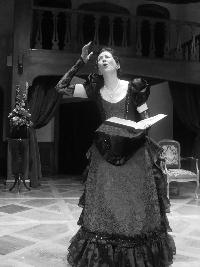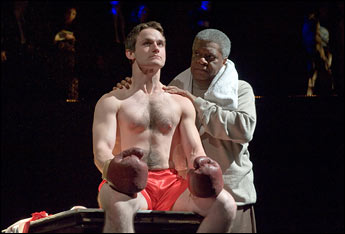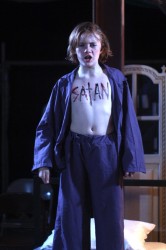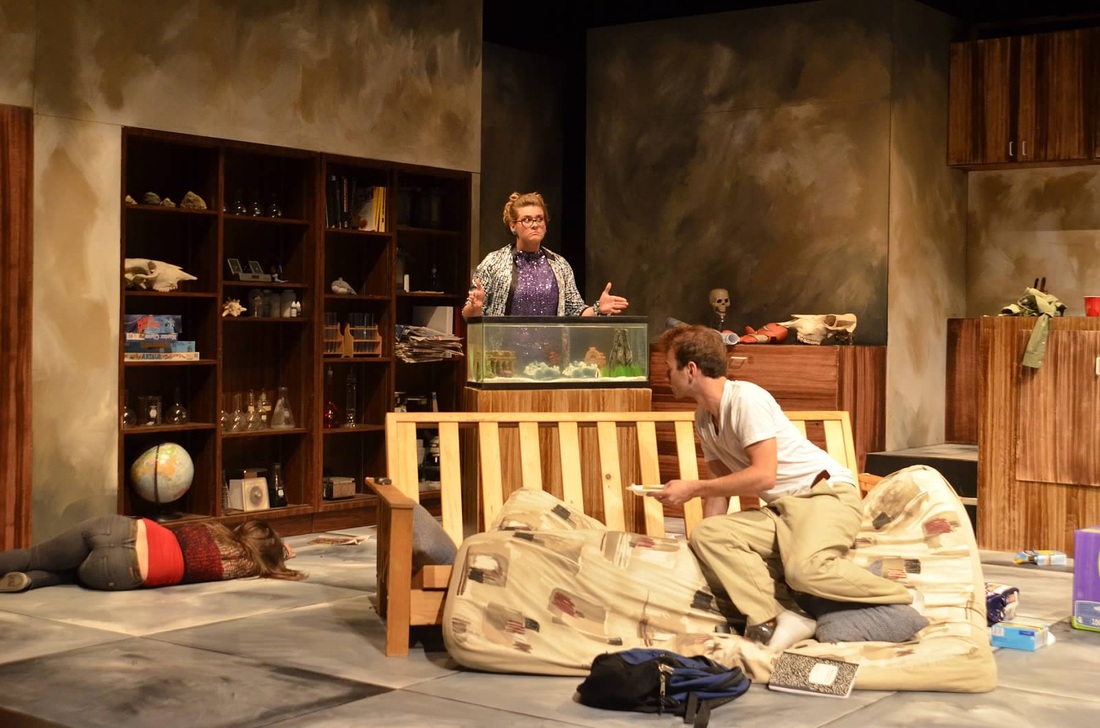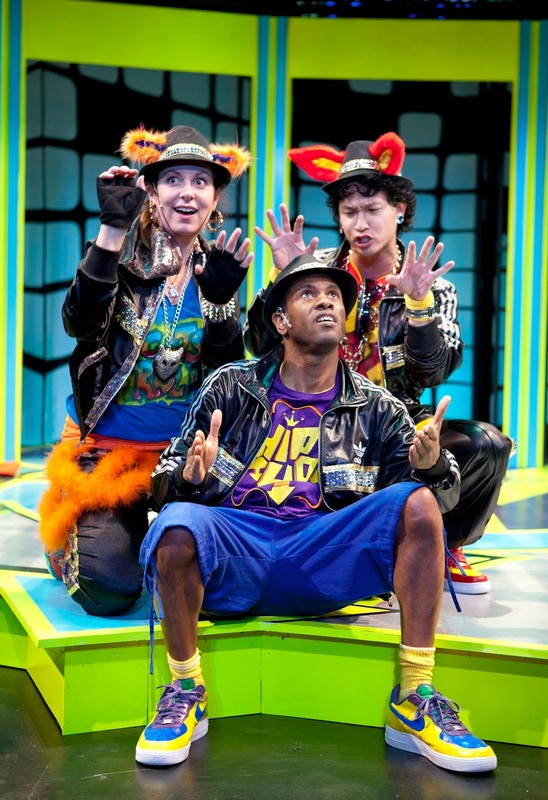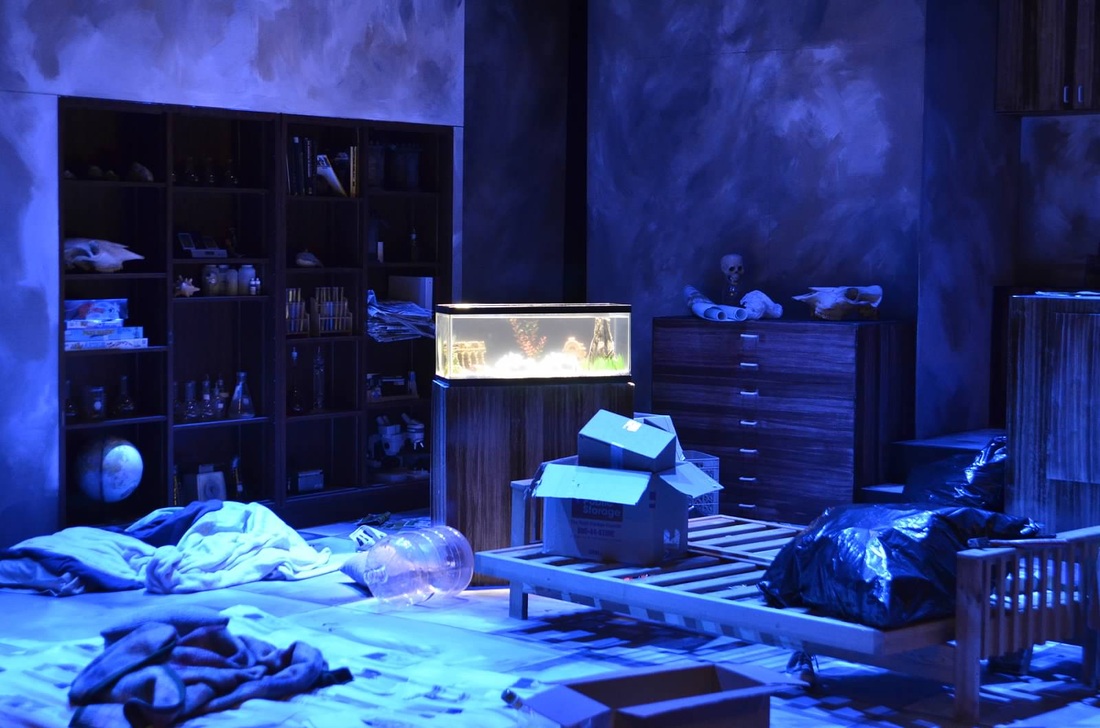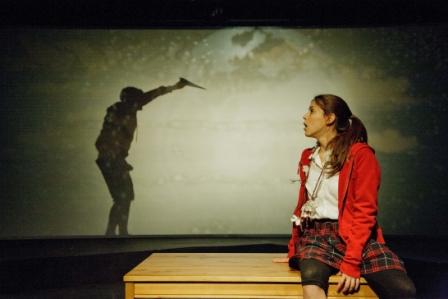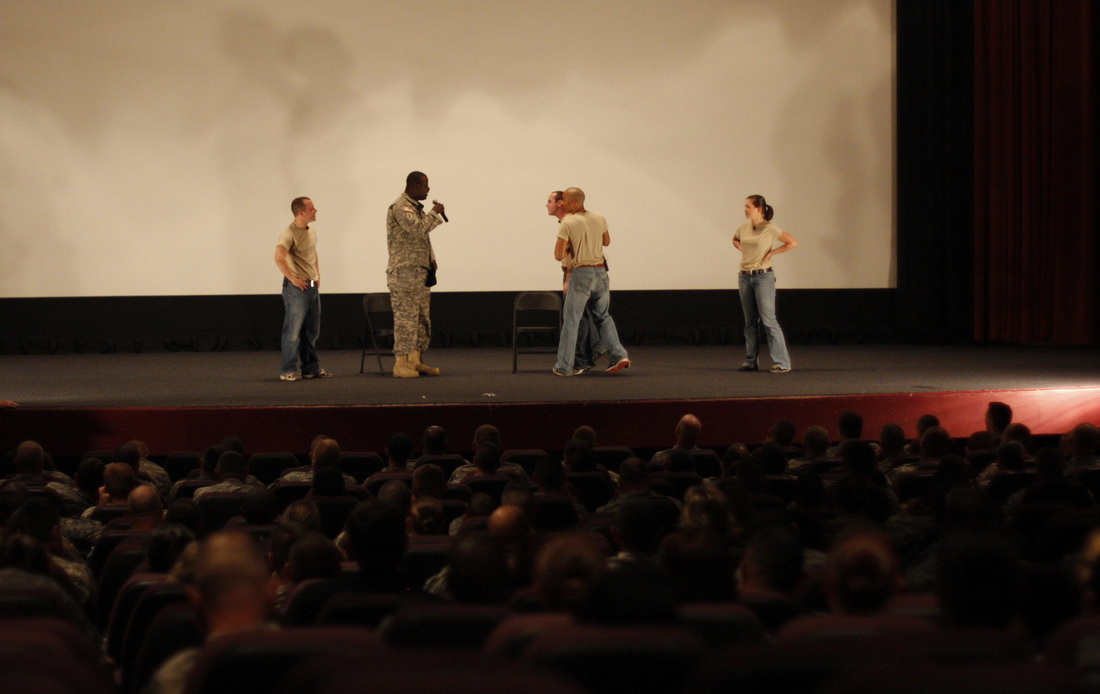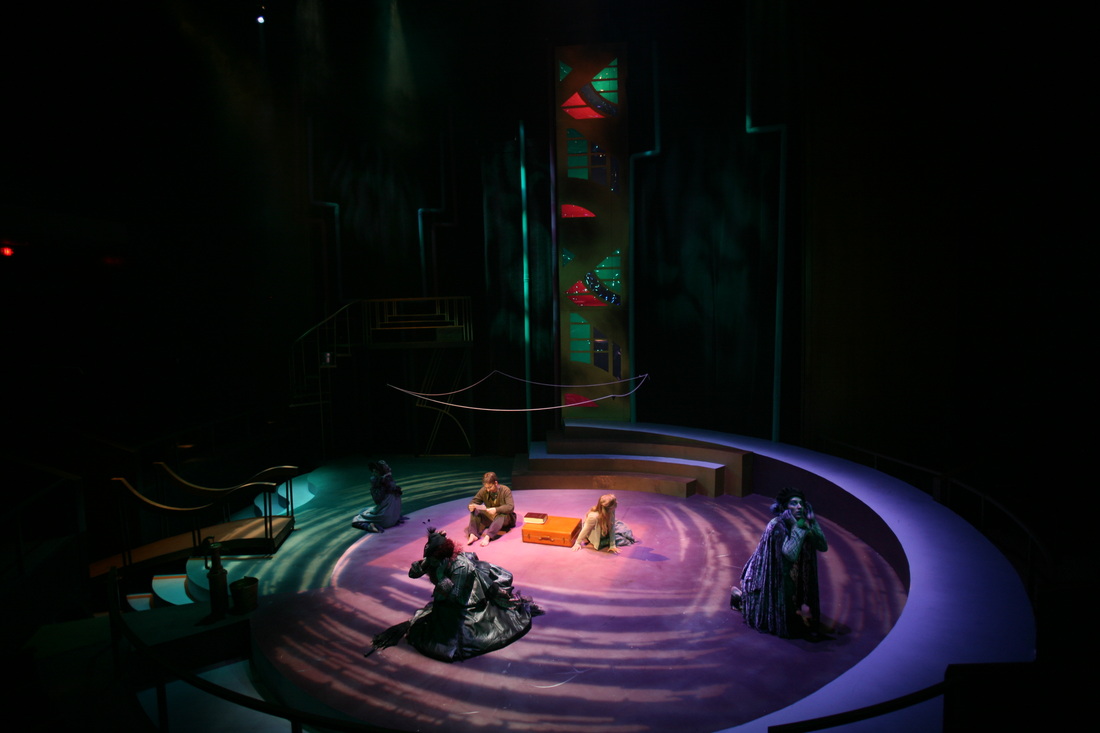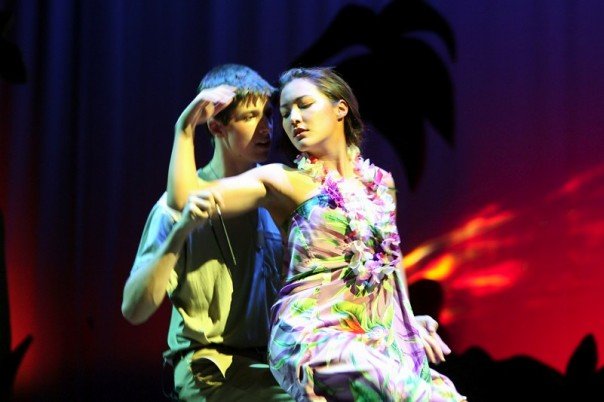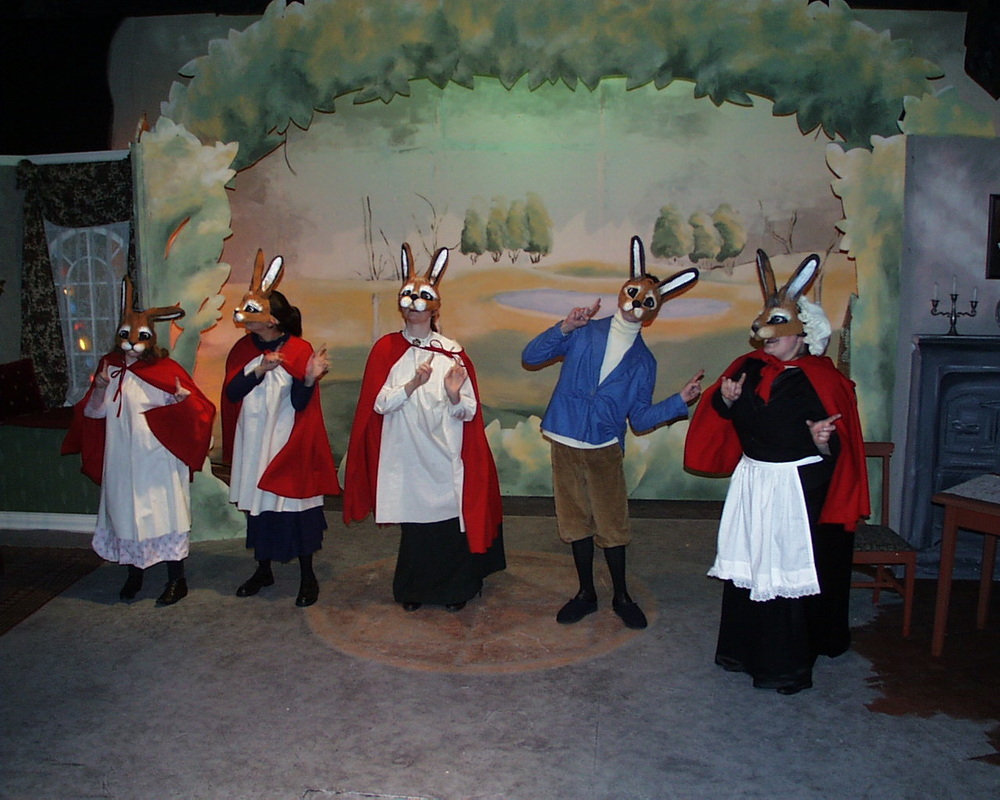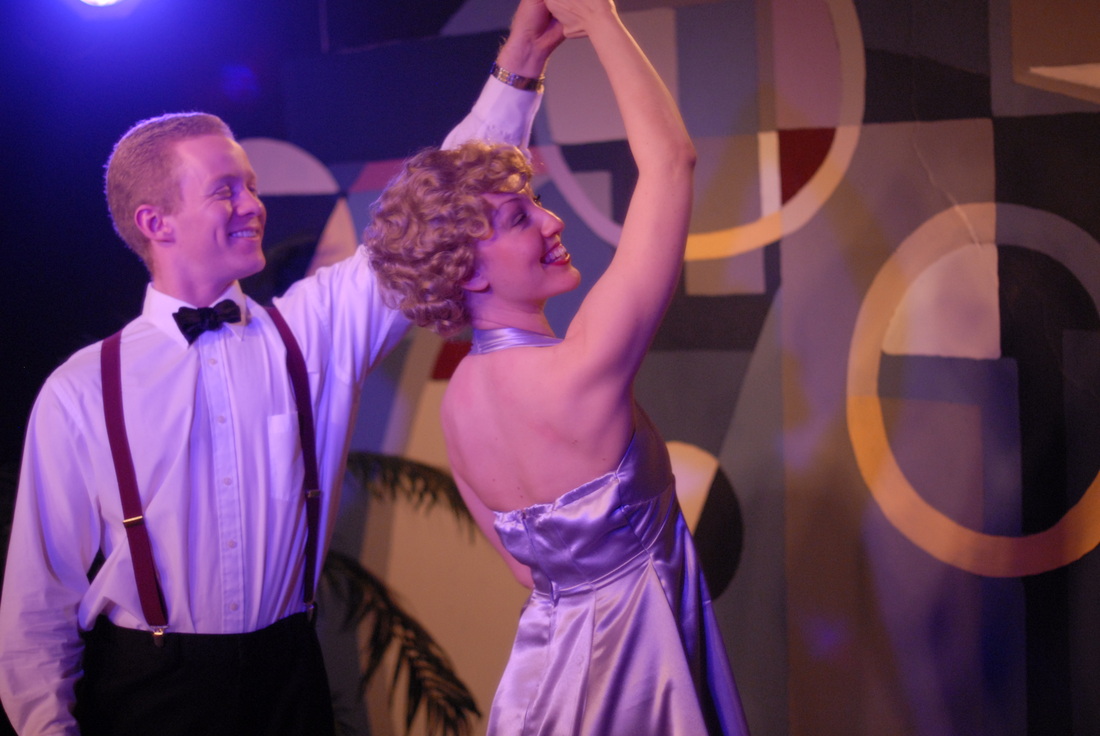 At 10:00 a.m., I'm taking part in an all out National New Play Network style AUSTRALIAN-AMERICAN PLAYWRIGHT SMACKDOWN. I was in Australia for the 2003 World Interplay Festival and left with zero dollars to my name and a special affinity for Australian playwright. It'll be interesting to hear where were all are in the process of creating theatre. Australian and American playwrights often wrestle with issues of gender, sexuality, race and immigration, but they’re doing so in very different ways, both aesthetically and thematically. New Dramatists Artistic Director Todd London and Georgetown University Professor (and playwright) Christine Evans lead an intercontinental playwrights’ conversation with Vanessa Bates, Declan Greene, Carson Kreitzer, Jacqueline E. Lawton, and Carlos Murillo about similarities and differences between their approaches and the cultures in which they write. Invitation only - www.nnpn.org The Referees 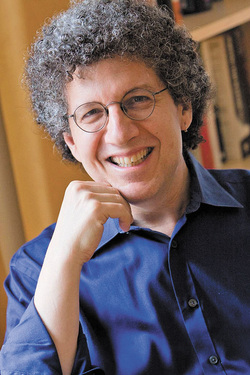 TODD LONDON In 2009, Todd London became the first recipient of Theatre Communications Group’s (TCG) Visionary Leadership Award, for “an individual who has gone above and beyond the call of duty to advance the theatre field as a whole, nationally and/or internationally.” He is beginning his sixteenth season as artistic director of New Dramatists, where he has worked closely with more than a hundred of America’s leading playwrights and advocated nationally and internationally for hundreds more. 2010 saw the publication of his book, Outrageous Fortune: The Life and Times of the New American Play (written with Ben Pesner), the product of a five-year study he led for Theatre Development Fund about new play production in America and the lives and livelihoods of playwrights. That year, he traveled across the country to lead meetings in 10 cities, intended to address the study’s findings and encourage a more vital environment for new work. A former Managing Editor of American Theatre magazine and the author of The Artistic Home, published by TCG, he has written, edited, and/or contributed to over a dozen books. His new book, An Ideal Theatre, an anthology of founding visions for American theatres that Todd collected, edited and introduced, is due out in spring 2012 (TCG). A series of his tributes to contemporary theatre writers, “A Lover’s Guide to American Playwrights” appears on howlround.com. Todd’s particular brand of advocacy journalism has focused on both the lives and livelihoods of individual artists and on the not-for-profit theatre movement, especially the impact of institutionalization on the field. His essays and articles have been translated for publication in Russia, North and South Africa, Scandinavia, Serbia, and Romania. Todd is a frequent featured speaker at conferences, universities and theatres. This summer he delivered keynote addresses at the Chicago Theatre Symposium, the Dramatists Guild of America’s first national conference, and TCG’s 50th anniversary national conference. He has won the prestigious George Jean Nathan Award for Dramatic Criticism for his essays in American Theatre and a Milestone Award for his first novel, The World’s Room, published by Steerforth Press. In 2001 he accepted a special Tony® Honor on behalf of New Dramatists, and in 2005 he represented New Dramatists at the Obie Awards, where the organization was honored with the Ross Wetzsteon Award for excellence. Todd has taught at Harvard and New York University’s Tisch School of the Arts and currently serves on the faculty of Yale School of Drama. He’s a past Literary Director of the American Repertory Theatre at Harvard and Associate Artistic Director of CSC Rep off Broadway and New Playwrights Theatre in Washington, D.C. He has two sons, Guthrie and Grisha, and is married to playwright and ND alumna Karen Hartman.ht (and New Dramatists alumna) Karen Hartman. 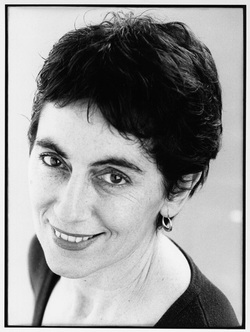 CHRISTINE EVANS Christine Evans’ plays have been produced and awarded in Australia, the US and the UK. Selected production highlights include Trojan Barbie at the ART, the Garage Theater, Playbox Theatre (UK) and Charing Cross Theatre (UK); Weightless, Mothergun and All Souls’ Day at Perishable Theatre; Slow Falling Bird at Crowded Fire, and in Australia, My Vicious Angel at Belvoir St. Theatre, Vitalstatistix, and the Adelaide International Festival of the Arts. Her plays are published by Samuel French (Trojan Barbie) Smith and Kraus (Best Monologues Theater Forum and NoPassport Press. Honors include a Rockefeller Foundation Bellagio Center Award, a Fulbright Award, Perishable’s International Women’s Playwriting Competition, the Jane Chambers Playwriting Award and the 2009 and 2013 Rhode Island State Council on the Arts (RISCA) Playwriting Fellowship. Evans is a Resident Artist at HERE (NY) and a Core Member of the Playwrights’ Center. She holds an M.F.A. and Ph.D. from Brown and joined the Georgetown Department of Performing Arts faculty in 2012. Her newest piece, You Are Dead. You Are Here. received a RISCA Playwriting Fellowship and will premiere at HERE in June, 2013. http://www.christine-evans-playwright.com The Contenders 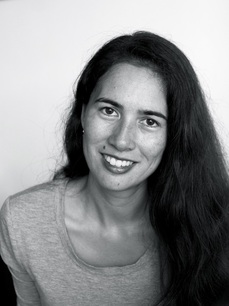 VANESSA BATES Vanessa Bates is an award winning playwright whose plays include: Every Second, The Magic Hour, Porn.Cake, Checklist for an Armed Robber, Match, The Elephant’s Ark, A Little Bit Each Night and Darling Oscar. In Australia she has been produced by Deckchair Theatre, Malthouse Theatre, Griffin Theatre, Belvoir B-Sharp, Vitalstatistix, Black Swan, theatre@risk, Tantrum and the Sydney Theatre Company as well as ABC Radio National. In London she has had two short plays produced by The Miniaturists: Petunia Takes Tea and At Sea. Vanessa was 2012 PWA Playwright in Residence at Griffin Theatre. She is a NIDA Playwrights Studio graduate and one seventh of playwrights’ company 7-ON. She has had several plays and monologues published as well as a narrative non-fiction book Legs Up & Laughing. Vanessa also writes television drama in Australia and is developing a feature length screenplay. 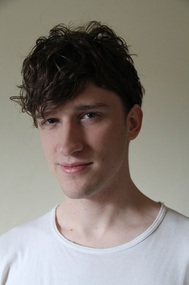 DECLAN GREENE Declan Greene is a playwright and theatre-maker from Melbourne, Australia. His works include Moth and Pompeii, L.A., and have been produced at the Malthouse Theatre, Brisbane Powerhouse, and Sydney Opera House. Awards include the Malcolm Robertson Prize, the Max Afford Playwrights Award, and an AWGIE for Theatre for Young Audiences. He is one half of DIY theatre duo Sisters Grimm (with Ash Flanders), and has co-created shows including Little Mercy and Summertime in the Garden of Eden. In 2013 they will produce work at Sydney Theatre Company, Melbourne Theatre Company, and Griffin Theatre. 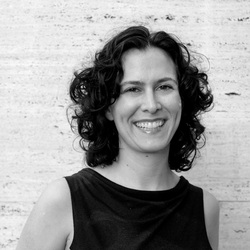 CARSON KREITZER Carson Kreitzer’s plays include The Love Song of J. Robert Oppenheimer, Self Defense, The Slow Drag (New York and London), 1:23, Freakshow, Slither, Behind The Eye, about surrealist muse and WWII Combat Photographer Lee Miller (Cincinnati Playhouse) and Flesh and the Desert,which premiered in January with the Workhaus Collective. Grants: NYFA, NYSCA, the NEA, TCG, the Jerome and McKnight foundations, and the first Playwrights Of New York (PONY) fellowship at the Lark Play Development Center. Affilliations: Workhaus Collective, the Playwrights’ Center, the Dramatists Guild, and New Dramatists. She and composer Matt Gould are currently under commission from Yale Rep and New Dramatists for their new musical LEMPICKA. More information at www.carsonkreitzer.com 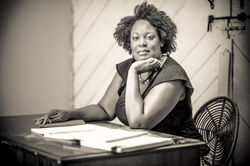 JACQUELINE E. LAWTON Jacqueline E. Lawton received her MFA in Playwriting from the University of Texas at Austin (Hook 'em Horns!), where she was a James A. Michener Fellow. She participated in the Kennedy Center’s Playwrights’ Intensive (2002) and World Interplay (2003). She is the author of Anna K; Blood-bound and Tongue-tied; Deep Belly Beautiful; The Devil’s Sweet Water; Ira Aldridge: the African Roscius; Lions of Industry, Mothers of Invention; Love Brothers Serenade, and Mad Breed. Lawton’s work has been developed and presented at the following venues: Active Cultures, Classical Theater of Harlem, Folger Shakespeare Library, theHegira, Howard University, Kennedy Center’s Page to Stage Festival, Rorschach Theater Company, Savannah Black Heritage Festival (Armstrong Atlantic State University), Shakespeare Theatre Company, Source Theatre Festival, Theater J, and Woolly Mammoth Theater Company. She is published in Experiments in a Jazz Aesthetic: Art, Activism, Academia, and the Austin Project (University of Texas Press). Lawton is a 2012 TCG Nathan Cummings Young Leaders of Color award recipient. She has been nominated for the Wendy Wasserstein Prize and a PONY Fellowship from the Lark New Play Development Center. She was named one of 30 of the nation's leading black playwrights by Arena Stage’s American Voices New Play Institute. Since 2010, Lawton has served on Round House Theatre's Artists' Roundtable. She is the recipient of numerous awards and fellowships including two Young Artist Program Grants from the DC Commission on the Arts and Humanities for Playwriting. She resides in Washington, D.C. 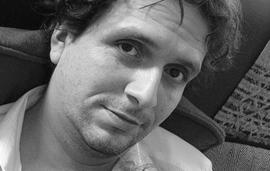 CARLOS MURILLO Carlos Murillo has been a resident playwright at New Dramatists since 2007. His plays have been produced at Theater der Stadt Aalen in Germany, Vígszínház in Budapest, the Humana Festival, NYC Summer Play Festival, En Garde Arts, Soho Rep, Hangar Theatre Lab, P73, Theatre @ Boston Court, Circle X, Son of Semele, Actor’s Express, Salt Lake Acting Company, Collaboraction, City Theatre of Miami and elsewhere. His work has also been seen at The Public Theater, New York Theatre Workshop, Goodman Theatre, South Coast Rep, Portland Center Stage, Madison Rep, Sundance Institute, The Playwrights’ Center, Bay Area Playwrights Festival, Chautauqua Conservatory, Annex Theatre and others. His work has been published by Dramatists Play Service, Playscripts, Inc., Smith & Kraus, Heinemann, and Theatre Forum. Awards include a Playwrights’ Center Jerome Fellowship, two Rockefeller MAP grants, two National Latino Playwriting Awards from Arizona Theatre Company, and he is the 2009 Otis Guernsey Award winner from the William Inge Theatre Festival. He has received commissions from The Goodman, Steppenwolf, Berkeley Rep, Playwrights Horizons, The Public, South Coast Rep, and En Garde Arts. Carlos has taught at the University of Iowa, the Kennedy Center, and is an Associate Professor at The Theatre School of DePaul University where he heads the playwriting program. Carlos is a resident playwright at Chicago Dramatists. He lives in the south side of Chicago with his wife Lisa Portes and their two children Eva Rose and Carlos Pablo.
0 Comments
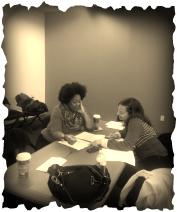 This past Sunday, we recorded my NNPN podcast play: West - the Grand Gesture. It was so much fun! The lovely and talented Shirley Serotsky served as our director; wonderful actors and Woolly Mammoth company members Dawn Ursula and Michael Willis were our featured performers, and the clever and charming Chris Baine was our sound designer. Ever supportive, patient and kind, Jojo and Jason were on hand for anything we might need, including pencils and last minute questions. Brilliant dramaturg Otis Ramsey-Zoe was with us in spirit and was absolutely essential to the development of the script. As I mentioned, this was my first time ever creating a podcast plays. Thank goodness Dawn and Michael have had a bit of experience in this area. We rehearsed for two hours; I made a few edits; and then we were ready to record. Dawn and Michael were dynamic, passionate, and so, so funny! Since the play features two friends walking West of Woolly, they even walked in place to get the feel for that kind of energy. Here are some photos from our day together! While researching this play, I walked the path from Woolly Mammoth to Pershing Park a dozen or so times. Each step flooded my heart and mind with memories from my six going on seven years of living in the nation's capitol. I first visited Washington D.C. in 2002, when I took part in the Kennedy Center's inaugural Playwright's Intensive. At that time, it was only one-week and from what I remember we were all university students. Prior to convening, playwright Naomi Iizuka tasked us with finding a myth that we wished to adapt. I chose Oedipus Rex and the ten-minute play that I wrote later became, Blood-bound and Tongue-tied. Once there, we had morning discussions at Cuppa Cuppa with directors and producers, writing workshops, lunch sessions with professional playwrights and dramaturgs, and the brilliant Gary Garrison talked to us about the business of playwriting. We also attended readings and productions, including, a reading/workshop of Tony Kushner's Homebody/Kabul, which was being co-produced by Woolly Mammoth and Theater J and later Woolly Mammoth's production of Charles Mee's Big Love. We even saw Wendy McLeod's The House of Yes, but for the life of me, I can't remember the name of the theatre company who produced it. This is where I first met the amazing, compassionate and generous Gregg Henry, who has become a central figure in my artistic life. He's one of three people I connect with before making any important career decision. I had lunch with David Ives, who had read my play and shared his thoughts with me. Of all he said, the following exchange is all I remember: DAVID: You have this inscription here. Why? ME: It sets the tone for the play. DAVID: You don't need it. ME: Oh. But wait, you use inscriptions in my plays. DAVID: Don't listen to me. I don't know what I'm doing either. It was amazing. This trip was also the first time I had ever seen the White House. I went there on my last day. I remember walking up to it and feeling so much excitement. My heart raced. When I got to the fence, I held on to the bars of the gates and peered through. I had to catch my breath. I was overcome by how truly momentous this entire experience had been for me. Here we are 10 years later. I've accomplished so much ... much more than I ever dreamed, but not nearly enough to call it a day. In fact, I feel ready to take on the next 10, 20, 30 years with as much passion, determination, discipline and focus as I can muster. And I must say, I'm pretty happy to be living this life here in D.C. The National Showcase starts today, but I won't be joining them until the Australian-American Smackdown panel discusion tomorrow morning. I'm going to tell you all about it, but for now, let's enjoy some of the sites you'll see on your travels West of Woolly.  A few weeks ago, the brilliant and innovative folks at NNPN commissioned playwrights Paige Hernandez, Stephen Spotswood, Gwydion Suilebhan and myself to write podcast plays to be presented during its 2012 National Showcase of New Plays. “When Washington was awarded the 2012 Showcase, we committed to shining a light on DC’s dynamic playwriting community,” says Executive Director Jason Loewith. “Who better to introduce visiting artists to the Nation’s Capital than these four extraordinary and extraordinarily diverse DC writers?” We were given specific directions of North, West, South and East, courtesy of Woolly Mammoth Artistic Director Howard Shalwitz, who thought this would be a great way to introduce audiences to as wide a range of Woolly's surrounding neighborhood as possible. Other than that, our only perimeters were that the pieces needed to be 10 to 15 minutes. It's been pretty exciting! Earlier this week, our plays were recorded onto iPod Shuffles and later today, the will be ready to depart the Woolly Mammoth lobby at all hours during the Showcase, November 29 – December 2. Here's a little bit about our experience: 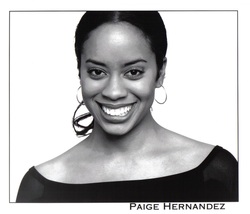 Which direction have you bravely accepted for the NNPN’s Podcast Plays? Paige Hernandez: NORTH! Have you ever written with such directional or geographical purpose before? PH: I haven't, but once I figured out what I wanted to write about, the directional prompt became the best idea ever! What excited you about this commission (what made you say yes)? PH: I love that the progress that theatre has made in terms of incorporating technology. In all of my works, technology has a strong presence (projection design, live tweeting, download the music etc), so doing a podcast play is right up my alley. It's a nod to the old fashioned radio dramas but with a modern, edgy twist. How did you approach writing your podcast play? Did you do any particular research or spend time in the area? Also have you ever written a play like this before? PH: Once I got my direction, the writing poured out of me. North of Woolly Mammoth has become such a bustling metropolis over the past few years so there was plenty of inspiration. I chose to write about street drummers. Specifically, the bucket drummers who play outside of the Verizon Center. For so long that sound, energy and artistry has been synonomous with that part of town. These brilliant Podcast Plays are a part of NNPN’s Executive Director Jason Loewith’s commitment to showcasing the work of DC areaplaywright during the 2012 National Showcase. What does it mean for you to be a D.C. playwright? PH: I'm honored. I'm so thrilled to call DC my home and to represent it on a National level is very special to me. My play references Go-go, a DC specific genre of music that deserves more national recognition. Even if my play enlightens just a few new folk to the go-go genre, then I have done DC proud! What’s next for you? Where can we keep up with your work? PH: I'll be performing in NNPN's stage reading of Blacktop Sky, December 1, directed by Jennifer Nelson. As for the new year, I'm touring a lot with my company, B-FLY ENTERTAINMENT. I've got a jam packed year with tour dates all over the US. I'll be back at the Kennedy Center to choreograph Jason The Invincible and I'll still be paying homage to the best music around with Liner Notes, my series at the Atlas. Lots of amazing things. www.paigehernandez.com 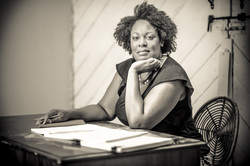 Which direction have you bravely accepted for the NNPN’s Podcast Plays? Jacqueline E. Lawton: WEST! Have you ever written with such directional or geographical purpose before? JL: No, but I have written with geographical purpose. MAD BREED is set in Hartford County, Maryland where the famous and notorious British/American theatre family the Booths lived. Our Man Beverly Snow is set in Washington, DC in 1835. Both Blood-bound and Tongue-tied and Severed Grace (formerly A Delicate People) are both set in Tennessee Colony, Texas where I was raised. What excited you about this commission (what made you say yes)? JL: Quite simply, because Jason asked me to do it. I'm in the habit of saying "yes" to suggestions made by brilliant men! Also, because I'm a huge fan of National New Play Network and love all their doing to support, nurture and advocate on behalf of playwrights in this country and beyond. Finally, it was something that I had never done before and so I took it on as a thrilling new challenge. How did you approach writing your podcast play? Did you do any particular research or spend time in the area? Also have you ever written a play like this before? JL: With a healthy dose of fear and gallons of enthusiasm! I had no idea what I was doing and I have zero sense of direction. But once, Jojo pointed me West, I at least knew where to go and I know this area very well. My first job in D.C. was at Woolly Mammoth, where I was the dramaturgy intern under Mary Resing. I also worked part-time as a box office assistant at the Ford's Theatre. On my lunch and dinner breaks, I would go for long walks all through this area. Plus, I'm a sucker for Christmas lights, so love how festive this area gets during the winter. Oh, and my first date in D.C. was at the 701 restaurant with a man who interestingly enough was a communist. While he happily paid the pianist to play more Charlie Brown Christmas songs for me, he refused to drive me to Union Station so I could catch my train back to Baltimore--where I still lived at the time and commuted daily. On reflection, I think this was part of his plan, because when I missed the train I called him and he graciously offered me his bed for the night. I declined his gallant offer and slept on the sofa in the Folger Shakespeare Library Education Center. Such are my many adventures West of Woolly and beyond! I also spent several hours walking up and down the route just to get a feel for what folks listening would experience. I even stopped in to some of the business and restaurant we see along the way and spoke with the folks who worked there. It was really fun! These brilliant Podcast Plays are a part of NNPN’s Executive Director Jason Loewith’s commitment to showcasing the work of DC area playwright during the 2012 National Showcase. What does it mean for you to be a D.C. playwright? JL: Since moving here in 2006, I've felt fortunate to live in a city where we have a plethora of opportunities to develop our plays and a few key opportunities to see our work produced/self-produced on stage. As playwrights, we’re surrounded by smart, talented, ambitious theater artist and arts administrators who are committed to working on new plays and nurturing emerging playwrights. The audiences in DC are diverse, savvy and intellectual. All in all, it’s an exciting, but sometimes hard and expensive city in which to live/struggle to survive as an artist. Artistically, we somewhat live in the shadow of New York, but I feel that's changing. It's been a slow mercurial, but steady change. What’s next for you? Where can we keep up with your work? JL: I'm working on a few new plays, including a holiday play for young audiences, a contemporary play about the evolution of a friendship and the war on women, and rewrites of my 10 minute play for Round House Theatre's Heyday Players. Our Man Beverly Snow
The Hampton Years
Publication My 10-minute play, Finals, Touchdowns and Barrel Kicks, originally written for Active Cultures’ Sportaculture Festival, was selected to included in the upcoming Vintage Books (Random House) anthology Plays for Two, edited by Eric Lang and Nina Shengold. You can keep up with me here on my blog and at www.jacquelinelawton.com 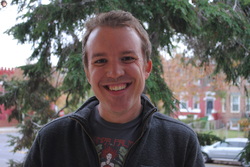 Which direction have you bravely accepted for the NNPN’s Podcast Plays? Have you ever written with such directional or geographical purpose before? SS: SOUTH. And, no. The closest I've come is contributing to a series of monologues that all took place in different rooms of a house. That was considerably less complex (and mobile) than this project. What excited you about this commission (what made you say yes)? SS: I think it was two big things. The first was the intimacy that the form could create. Having someone speaking right into your ear, practically inside your head, has a lot of potential to engage your audience. The second was the setting. I was delighted when I found out that no one had chosen South which, if you're unfamiliar with where Woolly is located, leads you to the National Mall. Having these grand avenues, this giant lawn, a 500-foot tall obeslisk, as set pieces is kind of fantastic! At the same time, with a podcast play, you're not limited to what the audience is seeing but to what you can convince them to imagine. How did you approach writing your podcast play? Did you do any particular research or spend time in the area? SS: I had an idea for a story before making it down to Woolly to explore. However, I was already relatively familiar with the area South of Woolly, and Googlemaps helped fill in the details. Since that initial idea, I've made the walk twice. The first was to film it for reference. The second was after having recorded a rough draft of the podcast play myself, so I could listen to it and see how it timed out with the walk. Listening to my own voice for 20 minutes (especially my voice saying the lines of these two particular characters) is just a little uncomfortable. These brilliant Podcast Plays are a part of NNPN’s Executive Director Jason Loewith’s commitment to showcasing the work of DC area playwright during the 2012 National Showcase. What does it mean for you to be a D.C. playwright? SS: Oh, this question. I've tried to answer this question so many times and I've never managed to nail it. I don't think being a DC playwright has anything to do with style or theme or subject matter. I think it has to do with being aware of the city, aware of what work is being done, and in communication with others making art here. And using that awareness and communication to help shape and inspire my own work. Which is a definition that can apply to any community, and I think I'm okay with that. What’s next for you? Where can we keep up with your work? SS: First up is a one-off remount of my 2011 Capital Fringe show, THE SISTERS OF ELLERY HOLLOW, which will be performed as part of the Happenings at the Harman series at Sidney Harman Hall on Wednesday, Dec. 5. at noon. And it's free! So, if anyone's in the Penn Quarter neighborhood and wants some lunchtime entertainment, stop on by. The first couple of weeks in January, with the help of Forum Theatre, I'll be remounting WE TIRESIAS--a tragicomic dissection of Greek tragedy and the human condition--that won Best Drama at this past summer's Capital Fringe Festival. It will run for two weeks at Silver Spring Roundhouse and, hopefully by the time this interview goes up, all the information will be available at Forum or Roundhouse's website. I'll also be working with Forum as a member of their artist ensemble to develop a new work being spearheaded by Natsu Onoda Power, which will premiere at the end of this season. And I've just become an associate artist with Pinky Swear Productions, and will be working to develop a new play for them over the course of the next year. And, last but certainly not least, I'll continue to fine-tune my newest full-length play, IN THE FOREST, SHE GREW FANGS, which I've developed with the help of Washington Rogues Theatre, and is scheduled for production next fall. 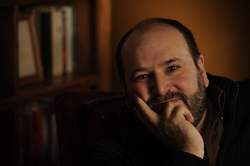 Which direction have you bravely accepted for the NNPN’s Podcast Plays? Have you ever written with such directional or geographical purpose before? EAST. And yes, I have written like this before: I've been creating a very similar piece (for a different part of the city) with banished? productions. As for whether my acceptance was brave? Not, I believe, in the least. What excited you about this commission (what made you say yes)? I was particularly excited to have a chance to extend the creative metaphor I'd established with my banished? piece across the city. I have in mind a longer project: a network of eight or ten related pieces situated all over DC. How did you approach writing your podcast play? Did you do any particular research or spend time in the area? Also have you ever written a play like this before? With regard to research: I started with a few long hours spent on Google Maps (using Street View) to plot a few landmarks in the area, then I took a good, long exploratory walk on foot to see how things felt. After my walk, I researched a few landmarks that really stuck with me in more depth -- thank you, internet -- and crowdsourced a few more ideas via Twitter. These brilliant Podcast Plays are a part of NNPN’s Executive Director Jason Loewith’s commitment to showcasing the work of DC area playwright during the 2012 National Showcase. What does it mean for you to be a D.C. playwright? GS: I wrote a long series of blog posts on being a playwright in DC about eight months ago, so I'm not sure I have anything new or profound to say on the subject. Perhaps I'll just say that it's good--very good--and getting much better all the time! What’s next for you? Where can we keep up with your work? GS: Well, dog & pony dc is to open A KILLING GAME -- I was a member of the devising ensemble, and this is a pretty terrific experience we've created, if I do say so myself. My play ABSTRACT NUDE goes up at The Secret Theatre in NY as part of the Wired Arts Festival in February. Shortly thereafter, I'll have a workshop and reading of THE GREAT DISMAL with The Inkwell here in DC, then I'll be opening a still-untitled dance-theater show I'm currently devising with Contradiction Dance at Round House Silver Spring in March. I'm a busy boy! Our coverage of the National New Play Network showcase would not be complete without the brilliance and eloquence of General Manager, Jojo Ruf. A few weeks ago, we had an opportunity to connect about her experience at NNPN and her work as a teaching artist, freelance director, program coordinator and much, much more. Here's our conversation: 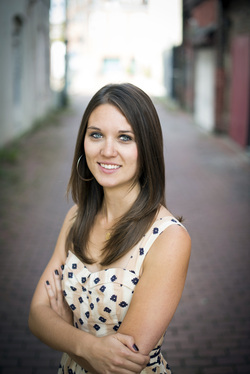 Jacqueline Lawton: Why did you decide to get into theatre? Was there someone or a particular show that inspired you? Jojo Ruf: I’m actually not sure I know the answer to this. I went into college as a math major not at all intending to participate in theater, but by the end of the first semester I was hooked. I really loved the community I found myself in, the driven and ambitious group of faculty and students who were incredibly welcoming and encouraging. So much so that after four years I couldn’t imagine doing anything else. JL: Since 2010, you’ve served as the General Manager of National New Play Network (NNPN). Tell us:
JL: Why does the American Theatre need National New Play Network? Jojo Ruf: NNPN was started 15 years ago by David Goldman and a group of these brilliant artistic and managing leaders of thirteen theaters spread out all over the United States. They believed that the next generation of new play development should be regionalized by connecting theaters across the country with their unique playwriting communities. They believed (and continue to believe) that, at its core, new play development should be collaborative, and that we can be stronger by working together. They believe that the nurturing and continued life of new work is of the utmost importance. These theaters would, of course, exist without NNPN, and there are plenty of theaters dedicated to new play development that aren’t part of the Network. But I think what David and these theaters were able to create is an incredible web of support. NNPN is relatively small – we have 26 Core and 13 Associate Member Theaters – and I think our size is a real asset. Our Core Member Theaters know each other’s aesthetics so well, which means that when Jasson Minadakis at Marin Theatre in Mill Valley reads a script he knows isn’t right for his theater, but is perfect for Seth Rozin at InterAct in Philly or Jack Reuler at Mixed Blood in Minneapolis, he’ll send it directly to them. And that happens all the time. Futhermore, the size of the Network allows us to adapt as need be, to create new programs and finesse established ones in order to subsidize taking risk on new work. A real strength, I think, as the state of American Theater is constantly changing. All of this is simply to say that I think the American Theatre needs NNPN because of the connections it helps to forge and the collaboration it helps to facilitate. JL: Tell us about the NNPN National Showcase and what excites most about the days ahead? Jojo Ruf: I don’t even know where to begin! This year’s Showcase is incredibly exciting, not only because of the caliber of work we’re presenting (plays by Steven Dietz, Carson Kreitzer, Carlos Murillo, Steve Yockey, and many others), but also because of the folks we have coming in for it. Representatives from 24 of our Core Member Theaters and 9 of our Associate Member Theaters, alumni playwrights, movers and shakers in the new play field, and a number of folks from the DC community will join us for four days filled with exciting readings, panels, discussions, coffee breakout conversations, and even an intercontinental playwright party! I’m also particularly excited that for the first time this year, we’re using the Showcase in part to shine a light on DC’s playwriting community. We’ve commissioned four podcast plays from DC’s finest writers (Paige Hernandez, Steve Spotswood, Gwydion Suilebhan and you!) to serve as travelogues leaving from Woolly’s lobby. The plays will be recorded on iPod shuffles and available to all Showcase guests, and I think it’s an incredibly exciting way to introduce our guests to both the neighborhoods and voices in DC. All in all it should be an exciting weekend. JL: In addition to your work at NNPN, you work as a teaching artist at the Ford’s Theatre. Their education program is really quite wonderful. Tell us about the work you for them. Also, as a theatre educator, why is arts integration necessary? What role or impact do the arts, and particularly theatre, have on childhood development? Jojo Ruf: I do! I work for three different programs: the Target Lincoln Oratory Festival, the Walmart Oratory Fellows Program (which focuses on long-distance learning), and a residency in Tyler Elementary School. Although the three programs are distinct in their goals and methods, they each focus on bringing oratory into the classroom. I’ve loved working for Ford’s Theatre, and I have to say that there’s nothing quite as moving as seeing a third grade class stand up on Ford’s stage and recite The Gettysburg Address in unison. There are many people who can speak with more authority on this than I ever could, but I think that on a very basic level arts integration can give students confidence in a way that almost nothing else can. Here’s my sappy story: A few years ago I was working with a class of seven- and eight-year-olds at Watkins Elementary School on the Hill. It was this group of incredibly diverse and whip-smart students, many of who knew as much about the Civil War as I do. There was this one student, Marco, who had this debilitating stutter. Kids can be impossibly mean, and while his classmates were surprisingly restrained, he rarely raised his hand in class. My work with Watkins was part of the Oratory Festival, and over four months Marco’s class used one of Lincoln’s speeches to learn both about oratory techniques (pace, emphasis, diction, tone, volume, etc.) and history. At the end of the four months each class performs their speech on the stage at Ford’s Theatre, and Marco was pretty terrified to stand up in front of everyone, nervous that he wouldn’t be able to get the words out. But he practiced his line every single day, and stood up on that stage for the performance and delivered it perfectly. No stutter, no hesitation. He ran up to me after their performance and was so proud of himself – I swear I’ve never seen a kid smile that big. That’s what arts integration can do. JL: As a Georgetown Alum, you’ve stayed connected with the university in an exciting way. In fact, we first met in the upstairs lobby at Studio Theatre when you were in the midst of producing Georgetown University’s Convening on Global Performance, Civic Imagination, and Cultural Diplomacy. We had all experienced Studio’s production of 1927’s The Animals and Children Took to the Streets and made our way to a lovely dessert and wine reception (that Derek Goldman and Daniel Banks invited me to crash!). Can you tell me more about the work you did with this convening? Also, what draws you to producing such massive convenings, conferences, and festivals? Jojo Ruf: I was the project coordinator for the three-day convening, which explored how to maximize the potential of theater and performance in the context of international challenges, and how to bridge the gap between the worlds of foreign affairs and policy, and global performance. We brought in more than 75 theater artists, policymakers, government officials, activists, cultural leaders, educators, and scholars from across the country and around the world, as well as Georgetown University faculty, students, and alums, and it was quite an exhilarating experience filled with unbelievable conversations. It also coincided with an on-campus residency with faculty and students from Baghdad University, whose Arabic adaptation of Heather Raffo’s award-winning 9 Parts of Desire was featured as part of the convening. I think there’s something incredibly addicting about the nature of convenings, conferences, and festivals. I love the rush of a long prep time and short event time, of those few days being all-encompassing, of meeting people from across the country and around the world who are all passionate about that one specific topic. It’s an exciting (and exhausting!) type of theater work, but one I find myself craving again and again. JL: You’re also a freelance director, which really excites me to no end as a playwright! Recent credits include: Tree House (Welders Theatre, world premiere), The Pull of Negative Gravity (Welders Theatre, DC premiere) and Translations (Georgetown University). What was the first play that you ever directed? What did you learn from that experience that remains with you today and impacts your work? Jojo Ruf: I directed this one-act play in high school (I can’t even remember the title at this point). But the first full-length play I directed was Translations by Brian Friel. To this day I think it’s the production I’m most proud of – we had this incredible set of a barn that Jamie Gahlon created, complete with a tree and hay and the smell of dirt and rain, and the process was just delightful. It didn’t hurt, of course, that Friel has such a way with language. But I think more than anything else that play taught me the importance of ensemble. We had this incredible team of actors and designers, and the production wouldn’t have been half as good without their incredible work and dedication. JL: In your spare time (!), you’re a featured writer for our beloved TheatreWashington, whose mission it is to promote, represent, and support “all segments of Washington’s professional theatre community — theatres, artists, company members, and audiences of all ages.” They really are all kinds of awesome! Now, with this work, you have your eyes and ears on the heartbeat of the DC Theatre community. So, tell me:
JL: My dear friend, playwright Jose Rivera often calls me the hardest working theatre artist in America. I now gladly hand this crown to you! How do you balance everything and find time to stay healthy, sane and rejuvenate? Jojo Ruf: I don’t know if I can rightly take that away from you considering how much you have going on! And I certainly don’t think I have quite found the balance. But I have to say that doing yoga fairly regularly has been incredibly helpful, a way to ground myself and stay relatively sane. And in this strange way, my commute has become rejuvenating. I have a 3.5 mile walk to work, and while I sometimes listen to NPR or music en route, often times just letting my mind wander and clear as I journey has been beneficial. JL: What advice do you have for an up and coming artists, be they teaching artists, playwrights, directors or producers? Jojo Ruf: Be willing to do anything. I don’t think anyone should be above folding programs or helping out when there’s a need for all-hands-on-deck, and I’ve found that sometimes simply watching and listening to others (as an assistant director, as part of an ensemble, as one of many writers in the room) can be unexpectedly informative. This isn’t at all implying that observing should impede on ambition and drive, but I think that sometimes learning from others both about what you would and wouldn’t do can be useful. JL: What's next for you? Where can we keep up with your great and inspiring work? Jojo Ruf: At the moment I’m just focusing on next week, and all the exciting things NNPN has in the coming months. As promised, we're going to spend the week getting to know the geniuses behind National New Play Network. Where better to begin than with the brilliant and fabulous Executive Director, Jason Loewith. With all he's had to do in the weeks ahead of the National Showcase, he made time for this terrific interview. Please enjoy! 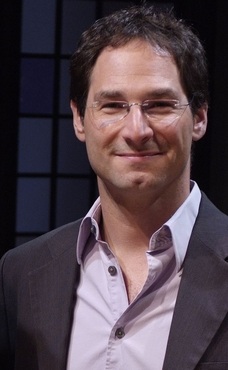 Jacqueline Lawton: Why did you decide to get into theatre? Was there someone or a particular show that inspired you? Jason Loewith: No one else would have me, right? It was the place I could just be me. At least at first… I’ve now spent 40 years trying to get that feeling back! There were many shows and people along the way that kept me on the path, but it would be really hard to pinpoint any particular one. Was it the Winnie-the-Pooh adaptation I wrote for my sixth grade class? Going to Gower Champion’s production of 42ND STREET with my new step-family when I was 14? Spinning my head around with Robert Woodruff’s BAAL when I was 20 at Trinity? Seeing Julie Taymor’s work at 30? A random word from a graduate school mentor? Advice from my first, second and third bosses in the field? My theater jobs in LA, Chicago, New York or DC? I’m an assembly of voices and proudly stand on the shoulders of the many, many beautiful people who have inspired me to make theater, and make it important. JL: From 2002-2008, you served as Artistic Director of Chicago’s Next Theatre Company. During which, you led the organization through tremendous financial growth and tripled the subscriber base. What is the most valuable lesson did you learned during your tenure? Also, what skills and traits do you feel a successful artistic director should have to support the health and growth of an organization? Jason Loewith: I learned that, to build a theater, you need to build a community. One of my mentors in Chicago, Michael Halberstam, told me he built HIS theater by standing in the lobby every night for the first three years, at every show, talking with his patrons. That’s what I did, and it worked – folks don’t come to theater the way they go to a movie. They go to a theater to be part of a community. And if you don’t provide that, if you don’t make them feel welcome and valued in the conversation, you can’t be successful. JL: Since 2009, you’ve served as the Executive Director of National New Play Network (NNPN). Tell us:
JL: Why does the American Theatre need National New Play Network (NNPN)? Jason Loewith: I do think the recent article in AMERICAN THEATRE, and my answer above, encapsulates it – we’re providing a new way of thinking about solving the challenges around new plays. It’s not magic, it’s not rocket science: it’s simply the energy created by a group of similarly-committed and similarly-passionate theaters around the country trying to get their hands on exciting new work. It works, in part, because these theaters are more ambitious about playing an important role in their communities than they are about making it on Broadway. JL: Tell us about the NNPN National Showcase. What excites most about the days ahead? Jason Loewith: I love the energy that comes with all these NNPNers in one place – you’re about to experience it first-hand! It’s just so energizing and exciting, watching connections happen and collaborations spring up… last year, the Showcase resulted in two Rolling World Premieres, and sometimes that happens right in the room! But I’m also really excited that, for the first time, we’re digging down locally (with your podcast plays) and expanding internationally (with the exchange with PlayWriting Australia). These are both initiatives I pushed, and I’m really excited to see how they expand the meaning and impact of the Showcase. JL: We first met on Inkwell’s The Actor and the New Play panel discussion and have since served on many panels together! At that time, I knew you as an extraordinary playwright and had just seen your critically acclaimed and award winning play, Adding Machine at Studio Theatre. Tell me a little bit about your writing process. Do you have any writing rituals? Do you write in the same place or in different places? Jason Loewith: I’m heading off to an artistic retreat this weekend, so maybe when I come back I’ll be able to tell you! Sadly, my ritual involves waiting until just before the deadline and then cranking it out – nothing mysterious. I find that I do my best initial work – sketching, thinking, imagining – when I’m out of town, away from home. And I have a long germination process – the idea needs to marinate for months (or sometimes years) before I’m really ready to put pen to paper. And then it’s a marathon, it’s like binging – if I need to do it for 48 hours straight until I have a draft of an act, that’s what I’ll do. However long it takes. I need to leave my other life behind completely in order to live in the world I’m writing. JL: Also, with so much going on, what inspires you to write? What do you hope to convey in the plays that you create--what are they about? What sorts of people, situation, circumstances, do you like to write about? Jason Loewith: It’s hard to really answer that… I’m almost afraid to answer that because once you name inspiration you’re afraid it won’t come again! I’ve lately thought much of what inspires me is being playful with language, and how language shapes identity in small and large ways. I can’t put my finger on it too precisely, but I think about the counting scene in ADDING MACHINE, the prologue of the new piece I’m writing, the overarching theme of the next project I want to write… they all seem consumed by language, identity, expression, expressionism… I don’t want to put my finger on it any more than that! JL: In addition to your work at NNPN, you are a brilliant and innovative freelance director. Recent credits include: DC’s Studio Theatre, Baltimore’s CENTERSTAGE and Everyman Theatre, and Atlanta’s Alliance Theatre. What was the first play that you ever directed? What did you learn from that experience that remains with you today and impacts your work? Jason Loewith: I’m getting a big head answering these questions J The first play I ever directed was Tom Stoppard’s DOGG’S HAMLET, CAHOOT’S MACBETH in college. I can’t remember any lessons I learned from that, which is probably why I’m continually reinventing the wheel. Oh – wait – I learned that I shouldn’t both direct AND design the set AND build it. JL: As a freelance director and quite man about town (I’ve seen you at many an opening!), you must have a good feel for DC theatre artists. So, tell me:
JL: How do you balance everything and find time to stay healthy, sane and rejuvenate? Jason Loewith: Wait. I’ve stayed healthy and sane? JL: What advice do you have for an up and coming theatre artists and practitioners? Jason Loewith: See theater all the time, even work you’re not sure you’ll like, figure out who your local role models are and volunteer to help them. Oh, and get my new book, out last week: The Director’s Voice, Volume 2. JL: What's next for you? Where can we keep up with your great and inspiring work Jason Loewith: I don’t know where you can keep up with my great and inspiring work, but the next thing I’m doing :0 is BIG NATE: THE MUSICAL at Adventure Theatre in May – it’s my first kids’ musical, I’m writing it with Chris Youstra; Michael Baron is directing, my favorite set designer in DC, Misha Kachman, is designing it; Michael Bobbit is the sweetest man on the planet… I’m having a blast and Michael says I’m gonna make a ton of money, so I may never turn back! 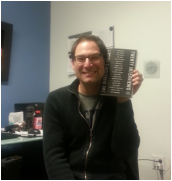 Here's our wonderful Jason with his newly released book, The Director's Voice, Volume 2, which was published by the lovely folks at Theatre Communications Group. I took this photo last Tuesday when I stopped in to say hello before spending a good six hours researching my NNPN podcast play (more on that anon). I've almost convinced him to let me host the book release party here in D.C.! I've ordered my copy and here's why you should as well: “Directors today are equipped with a larger toolbox than their forerunners, standing on their shoulders as well as those of pioneers in non-Western theater, experimental visual art, community-based theater, and the ever-evolving commercial theater scene.”— Jason Loewith This second volume presents a cross-section of the most diverse and dynamic stage directors defining today’s American theater, in conversation with director/producer Jason Loewith. A follow-up to the immensely popular first volume, which has sold over eighteen thousand copies, much has changed in the twenty years since The Director’s Voice debuted. “The nonprofit model has been turned on its head,” Loewith notes. “Institution-building is out for these directors; creating a distinctive voice from a multiplicity of influences is in.” Together, these directors sketch a compelling portrait of the art form in the new century. Interviews include: Anne Bogart, Mark Brokaw, Peter Brosius, Ping Chong, David Esbjornson, Oskar Eustis, Frank Galati, Michael Kahn, Moisés Kaufman, James Lapine, Elizabeth LeCompte, Emily Mann, Michael Mayer, Marion McClinton, Bill Rauch, Bartlett Sher, Julie Taymor, Theatre de la Jeune Lune (Barbra Berlovitz, Steven Epps, Vincent Gracieux, Robert Rosen, and Dominique Serrand), George C. Wolfe, and Mary Zimmerman.  From Thursday, November 29th to Sunday, December 2nd, I'll be attending and participating in National New Play Network's National Showcase of New Plays. I'm thrilled and honored to take part in this celebration of new plays and convening of passionate, talented and dedicated theatre artists. Now, here's a bit of information about the National Showcase: "The National Showcase of New Plays is a rotating festival, or trade show, that showcases new plays, new playwrights and theaters from across the country in a staged reading format. By crowd-sourcing the dramaturgical expertise of our wide membership, the Showcase creates a unique and invaluable opportunity for dozens of production-ready new plays to be viewed by artistic directors, literary managers, literary agents, publishers, and independent producers from around the country. To date, nearly 100 plays have been showcased, of which 80% have been subsequently produced at professional theaters inside and outside NNPN, garnering Pulitzer nominations, Steinberg Awards, and dozens of new-play citations in their local markets. A nationwide panel of NNPN-affiliated artists has selected six extraordinary plays for this year's Showcase, its tenth installment: Christina Anderson's BlackTop Sky, Carlos Murillo's Diagram of a Paper Airplane, Carson Kreitzer's Lasso of Truth, Steve Yockey's Pluto, Steven Dietz's Rancho Mirage, and Peter Sinn Nachtrieb’s The Totalitarians. The 2012 Showcase will also feature two plays from Down Under as part of an exchange with PlayWriting Australia, that country's peak playwright-support organization: Every Second by Vanessa Bates and Moth by Declan Greene." How exciting is that! New this year, NNPN commissioned four D.C. area playwrights to write podcast plays! You'll hear more from us on Wednesday. For now, here's what NNPN has to say about the work we've been doing: "Need a break? Pick up an iPod Shuffle in the Woolly Mammoth lobby, walk out the door and press play to be taken on a 15-minute adventure through the neighborhood, written by one of Washington’s own extraordinary playwrights. Whether you head north or south, east or west, you’re sure to end up in a dramatically different place! North, South, East and West were commissioned by NNPN especially for Showcase guests, and are written by Paige Hernandez, Jacqueline E. Lawton, Stephen Spotswood and Gwydion Suilebhan." WooHoo! On Sunday, we rehearsed and recorded my podcast play, West - The Grand Gesture. I'll share more about all of that on Thursday. I've got some great pictures too! There is no charge to attend the Showcase, but it is an invitation-only event for NNPN Core and Associate Members, Alumni Playwrights, Board, Ambassadors, special guests, and members of the host city's new-play community. And it's booked, but don't despair! For those of you unable to attend, I'm going to share a lot here about what we're doing. Be sure to check back here for wonderfully insightful interviews from NNPN's Executive Director, Jason Loewith and General Manager, Jojo Ruf. Jacqueline Lawton: What was the first play that you ever directed? What did you learn from that experience that remains with you today?
Lee Mikeska Gardner: My first directing experience was play I wrote in the 6th grade. I had run through the 6th grade English curriculum (thanks to an ex-English teacher mother) and my teacher needed to keep me occupied, so for extra credit I wrote a play about Japanese culture, a subject we were studying, and directed it. It starred my best friend, Diane Webb. There was a lot of bowing. Much to the disappointment of my ex-English teacher mother, I gave up writing soon thereafter and began my theatre adventures. I was 12. I never looked back. I had a great Jr. high/high school program, and later college program that gave me the fundamental skills and honed qualities I use to this day, including tenacity bordering on mule-stubbornness. I worked very hard for my accomplishments - the years when I desperately wanted to act and had braces that gave me “peanut butter mouth” were a special kind of torture. But there was always something to do to keep me engaged. Throughout high school and college I assumed I‘d go into acting and stage managing - I never thought of directing. In both settings wise teachers saw something in me and casually suggested I direct this or that or take a class in directing. But I didn’t consider myself a director until I co-directed Fat Men in Skirts with Howard Shalwitz at Woolly Mammoth. Until then, I was an actor who filled in as a director when none could be found. My interest was in making the actors look good. I was a happy with black cubes and furniture borrowed from my house. I directed (and and acted) for many years at the original Source Festival and went on to form Vest Pocket Theatre Company, which survived a couple of years before I realized how little I really knew about running a theatre company. With Fat Men, I worked side by side with Howard, for whom I had assistant directed on a couple of shows, and began what I consider my M.F.A. in directing. I was on the 10 year program, about how long I was an Associate Artist at Woolly Mammoth. I took my fundamental passion for a good yarn, learned craft and began to articulate my aesthetic. After that show I just kept working as a director and haven’t really stopped. Directing comes easily to me: acting is much harder - all my degrees and formal training are in acting. But I could never do one without the other. JL: Why did you decide to get into theatre? Was there someone or a particular show that inspired you? LMG: I went into theatre to escape a home life filled with mental and physical illness. My parents couldn’t catch a break and as much as they loved their children, they were uncommunicative and dysfunctional and even at 12, I intuitively knew I had to find a way out of that daily tension. My story of 6th grade playmaking is true - it’s how I was introduced to theatre - but the events at home compelled me to take full advantage of the escapist aspects of theatre and for a long time fueled my work. My parents inspired me, in an anti-role model way. Because each of them were not allowed to pursue what they really dreamed of doing (astronomy, medicine) they were not about to tell their children they couldn‘t do something. But they weren‘t thrilled with the idea of theatre and they made me work for it. As I watched them succumb to illness in my early 20’s the equation, to me, equaled “don‘t do what you love, live unhappily and die early.” Because of my parents, and my rocky home life, I had something to say as a director at a very early age - I didn’t struggle to find my voice and exploring the fundamental human condition of sorrow will always be of primary interest to me. Theatre is in my bones. While I write about directing in this forum, I speak of theatre as a Theatre-maker. I have settled in to acting and directing, with some teaching thrown in, but I’ve worked at every aspect of theatre-making at some point. I’m not always good at it, whatever it may be, but I’m capable, and I possess an intuitive and relentless need to learn. I have tried several times to quit - to find an easier way to make a living and have a life - but I come back to it. Or it comes back to me. Making theatre is active. It satisfies my intellect, my hands, my need for challenges, my social needs, my need for expression, my undiagnosed A.D.D. and my desire to have an impact on people, in a way that no other profession does. JL: What kind of work do you do to pay the bills? How do you balance this work with your work as a director? LMG: Balancing the financial issues is easy. Balancing the quality of life choices is so individual. I’ve had all manner of jobs to supplement my theatre work when needed. For a long time I was an Executive Secretary to an attorney until I decided to make a go of living off my theatre income and turned over the job to a favorite stage manager. I’ve temped, I’ve worked retail, I’ve had two disastrous stints as a personal assistant, I went into theatre management, I went to grad school and lived off student loans… A condition of every job was that I was allowed to take the time I needed to do theatre. I sacrificed benefits and insurance, often, for time and a decent hourly wage. As I get older, I have a vague fear of never being able to quit working - but then, I don’t really want to. I knew from the time I was 12 I would have this kind of life and realized at about 18 what that meant financially. Facing my parents’ mortality drove me to a “live for the moment” philosophy rather than a “save for the future” philosophy. Facing my son’s future, I’ve started to balance those scales a bit. JL: In DC, we have the Capital Fringe Festival, the Intersections Festival, the Source Festival, the Kennedy Center's Page-to-Stage Festival, the Black Theater Festival, and the Hip Hop Theatre Festival. We also have the Mead Lab at Flashpoint Theater Lab Program. Have you participated in any of these? If so, can you speak about your experience? LMG: I’ve done a few things with these entities, but they’ve never been central to my work. Others can speak more intelligently on this topic. JL: How many plays have you directed in the DC area? How many of them were written by women? By playwrights of color? How conscious are you selecting plays by women or people of color when deciding your season? LMG: Including workshops, readings and academic theatre, I’ve directed over 70 productions. About half of them were plays written by women. Only one or two of them have been by playwrights of color, as a white woman director, I’m not seriously considered for plays written by POC. I don’t like being labeled as a “white woman director” so I don’t label the work of others. It doesn’t mean I’m not aware of the disparity of white men and everyone else - it means that when I’m offered a good play, I do it, regardless of by whom it’s written. JL: How do you feel the DC theatre community has addressed the issues of race and gender parity? How has this particular issue impacted you and your ability to work? LMG: The theatre community is highly aware of the lack of diversity in theater programming and has been for 20 years. The idea of racial parity first hit D.C. two decades ago when it became clear how absurd a city that had a majority black population had no black theatre or that other theatre’s weren’t giving black artists a place at the table. Theatres began mindfully to program plays by writers of color and start “color-blind” casting. I actually lost roles due to this policy and was not hired to direct “black” plays because I wasn’t. The idea of gender parity didn’t even occur to me until I was hired for a show because someone was looking for a “woman” director. I recently was talking to a director who had relocated from NYC and she was telling me about a job she didn’t get because she was no longer a NY director. She was saying (and I’m paraphrasing) it drove her crazy “because I’m a --” and I inserted “good director.” She said “… New York director. I still consider myself a NY director.” The fact is, we all have biases and we all have to work at getting our work done. Another fact is, white men, as a general rule, find it easier to do. The issue is - always - public support and funding. The several theatre companies that arose to address the lack of representation by woman, people of color, and the GLBT community didn’t survive, leaving it up to the theatres run primarily by white guys to take up the slack. Really!? Now keep in mind, it was white guys who gave me every break since high school along my career path. I got nothing against the white guys. There is no question that there is a need for mindful programming representing the community and world in which we live, regardless of who is making those decisions. But the audiences need to be there, the funders need to be there, the artists need to be up to the task, to make it stick. Making theatre with a diverse group of artists is not the problem. Getting people to the theatre is the issue because baseline reality - theatre is a business, not a social service. If we want more representation, we have to make a lot more noise and be prepared to self-produce and, ultimately, find the audiences who want to support us. JL: If you could be direct at any theatre in DC, which would it be and why? LMG: I like to work at theatres that do interesting work and whose Artistic Directors have good minds. Forum, Constellation, Rorschach, are a few theatres on my list that I haven’t tapped into yet. JL: DC audiences are ... LMG: Intelligent, passionate, adventurous, supportive and still too small. JL: DC actors and designers are ... LMG: Creative, committed, professional, smart, bold, willing, alive, eager, the best. JL: DC playwrights are ... LMG: Under-recognized, although I think that’s changing. I think with the advent of locavore theatre more new work is getting produced at different levels and that can only benefit everyone. A playwright can’t get better at what they do unless they get to do what they do and that means productions. D.C is good at importing talent - I’d like to see more export, too - which means I’d like to see more theatres take risks, which means I’d like to see more audiences supporting theatre, which means funders have to pay attention, which is another conversation altogether. JL: DC critics are ... LMG: Not in love with theatre any more. At the least the ones at the major print publications. I feel the love from the on-line media sources and I go to them first these days, but I also wince at a lot of amateurish writing. I am being quite blunt - but I have been known to write to a critic about a badly written or unfair review, so this should be no surprise to any of them. And let me get on a soap box now. I don’t like that one person (or a handful) has the opportunity to dictate the success of a production. It’s bad business. Any artist who thinks challenging a review is “sour grapes” and therefore won’t, is allowing other people to define the art form. I won’t ever challenge someone’s subjective reaction to the work, but I don’t take bad or lazy writing or a limited view-point quietly. I usually write privately to the critic because I’m challenging his or her skill or focus - but every now and then I’ll do it publicly because I want the give and take of other viewpoints. Ultimately, the role of the critic these days has been reduced to a piece of a marketing plan. Good reviews - Plan A. Bad or mixed reviews - Plan B. And what I want, as an artist, is public and private conversation. I don’t do my work in a bubble - I do it to challenge myself and challenge/entertain others and I never mind a little thoughtful pushback. It’s one of the ways I learn. I want the reviewers to work as hard as I do to get better at what I do to get better at what they do. JL: What advice do you have for an up and coming DC based director or a director who has just moved to D.C.? LMG: I became a director by accident during a time of growth and my direct experience is atypical. But I know what I was looking for when I was running theatre companies and hiring artists. Take the time to see theatre. Check out big and small companied. Identify the kind of work or style you are drawn to - not that you have to be boxed in by that, but with 80+ working theatres, you can’t hope to network with all of them at the same time. Send out your materials. Know how to talk about yourself and what you like to do. Expect slow going, but be tenacious. Work the Fringe, the Source, the Festivals, The Actors’ Center. Let people know what you are doing. A director with a background like Eleanor Holdridge’s will find a place quickly, but up and coming directors will have to be focused and patient and ready to make theatre. To all artists who are struggling to find their place in any city - know what else you love to do and do it. An unhappy theatre artist presents a tense, unhappy person that is hard to hire. Know that you probably won’t work steadily for awhile and find joy in other parts of your life that will feed the theatre work when it does come. And have faith in two things. 1. There is no expiration date on how long you can work if you choose. You can come and go as your life dictates and while there may be hard choices, you don’t have to sacrifice family or friends to find success. 2. Your life will feed your art. Someone who’s life is wrapped around theatre only becomes a dull artist. With no world view or outside interests you have very little to talk about on stage. JL: What's next for you as a director? Where can we keep up with your work? LMG: First, I’m playing Mrs. Fisher in a 1924 play called The Show Off by George Kelly at The American Century Theatre. Then I’m directing The 25th Annual Putnam County Spelling Bee with the Washington Savoyards in March, a new Allyson Currin play, Caesar and Dada in May at WSC Avant Bard and Blythe Spirit at 1st Stage. After that, it’s a mystery. Jacqueline Lawton: Why did you decide to get into theatre? Was there someone or a particular show that inspired you?
Renana Fox: My grandmother and aunt are both theater professors and successful directors (by which I mean they have consistently gotten paid for their work). With two strong female role models and a cultural heritage of performance I had a lot of reasons to pursue a life in the theater. My mother was both an educator and a professional storyteller and growing up I watched her perform and found her ability to engage an audience somewhat magical. It certainly wasn’t a single moment where I realized that this was the life for me, it was more an accumulation of experiences that made me realize theater was meaningful and transformative. JL: What was the first play that you ever directed? What did you learn from that experience that remains with you today? RF: I actually just finished directing my first full production a few months ago for Artists Initiative. It was called BOOM! by Peter Sinn Nachtrieb and I’ve been in love with the script since I first read it four years ago. I would say most importantly I learned to be confident in my choices. I spent a long time directing readings and assisting people so it’s hard to trust that you’re finally experienced enough to make your own decisions, but it’s also really exciting. JL: What kind of work do you do to pay the bills? How do you balance this work with your work as a director? RF: All kinds of things! I temp at non-profits, I work as a substitute teacher for DCPS and a local daycare center. I work as a teaching artist for local theaters. I babysit. I try to find work that allows for a creative outlet, that makes me happy, and that offers flexibility for the theater job opportunities that come along. I can’t do bartending or retail mainly because I know I have to spend a lot of time waiting for the next theater job, and I need that time to be used for something I find just as fulfilling and meaningful as the art I create. JL: In DC, we have the Capital Fringe Festival, the Intersections Festival, the Source Festival, the Kennedy Center's Page-to-Stage Festival, the Black Theater Festival, and the Hip Hop Theatre Festival. We also have the Mead Lab at Flashpoint Theater Lab Program. Have you participated in any of these? If so, can you speak about your experience? RF: The only one of those festivals I’ve participated in is the Capital Fringe Festival. I worked as a performer and costume designer for several shows and it is a very interesting process. It gives a lot of new artists opportunities, which I think is wonderful. There’s no filter so some work is fantastic and some is terrible but everyone gets to give their art a try. The biggest problem I have found is that the audience draw is not big enough or varied enough to fill all the seats, which makes it hard to break even, much less get your art seen. JL: How many plays have you directed in the DC area? How many of them were written by women? By playwrights of color? How conscious are you selecting plays by women or people of color when deciding your season? RF: I’ve directed three staged readings and one full production since moving to DC two years ago and only one of those was written by a woman. I think it’s incredibly important to support women and people of all ethnic backgrounds in the theater, but equally important for me is to connect with the piece I am going to direct. Finding a new, young, playwright at the same stage in their career as I am, with a similar approach to theater is hard enough. If I can meet someone who is all that and a woman, I feel incredibly lucky, but at this point I’m just happy to work with someone whose work I enjoy and respect. JL: How do you feel the DC theatre community has addressed the issues of race and gender parity? How has this particular issue impacted you and your ability to work? RF: I’m not sure the theatre community has really addressed the issues. I think most theatres still produce shows that are primarily white-men-focused. Then there are theaters that produce shows focusing on African American themes or ‘women’s issues’ but there aren’t a ton of productions (and maybe not enough scripts) that reflect the gender and widely varied backgrounds of audience members. I don’t know that this particular issue has hindered my ability to work, so much as my youth and a tendency among most theaters here to be loyal to past artists and continually hire them back. JL: If you could be direct at any theatre in DC, which would it be and why? RF: My dream is to direct for Woolly Mammoth. I think they do wonderful work to support new artists with unconventional approaches to theater. They take risks and when they fail they fail big, but when they make something good, it is phenomenal. I want to work in an environment that supportive and encouraging of its artists. JL: DC audiences are ... RF: Out there, we just have to find them and let them know DC has great theater that they don’t know about yet. The ones who already know about us are dedicated and loyal, they’re just all friends with each other and have both limited time and limited funds. JL: DC actors and designers are ... RF: Incredibly hard working and dedicated to their art. JL: DC playwrights are .. RF: Provocative and eager to make a difference with their art. JL: DC critics are ... RF: Often too focused on their own opinions as opposed to objectively judging a production based off its artistic value. JL: What advice do you have for an up and coming DC based director or a director who has just moved to D.C.? RF: Make friends and see all the theater you can. JL: What's next for you as a director? Where can we keep up with your work? RF: I’m directing another short piece for an upcoming Inkwell festival in December. After that just keep your eyes peeled for my name on DC Theater Scene and Actors Center. Jacqueline Lawton: Why did you decide to get into theatre? Was there someone or a particular show that inspired you?
Amber Jackson: I guess you could say I found my way into theatre through film. I grew up watching the old MGM classic musicals and my appreciation for theatre evolved from there. JL: What was the first play that you ever directed? What did you learn from that experience that remains with you today? AJ: The first play I ever directed was a short 10-minute piece written by my theatre professor, who is also a playwright. We rehearsed that thing to death. So I started coming up with exercises for the actors to help keep it fresh: Do the whole scene with just movement and no words/Do the whole thing but say it in your own words/ Play one of the other characters in the scene. I still love to incorporate exercises like that in my rehearsal process when there is time. JL: What kind of work do you do to pay the bills? How do you balance this work with your work as a director? AJ: I feel like one lucky lady because my “day job” is actually writing and directing film for a company called WILL Interactive. I love it. I love the challenge of switching between theatre and film as two powerful storytelling mediums. While WILL focuses 90% of its time on film, the one exception is a live production on the topics of Suicide and Domestic Violence Prevention for the US Army at Fort Hood, TX. I have had the honor and privilege to direct this work for 3 years, and it is by far the most fulfilling work I do. JL: In DC, we have the Capital Fringe Festival, the Intersections Festival, the Source Festival, the Kennedy Center's Page-to-Stage Festival, the Black Theater Festival, and the Hip Hop Theatre Festival. We also have the Mead Lab at Flashpoint Theater Lab Program. Have you participated in any of these? If so, can you speak about your experience? AJ: Yes, and I love them all!!! My very first project in DC was directing a piece for Inkwell Theatre at the Page-to-Stage Festival. I think it’s a fantastic way to join the theatre community together to celebrate new work. I have had the privilege to work with the Source Theatre Festival twice: I directed a 10-minute play in 2011 and a full-length play this past summer. Jenny and the team there are so committed to bringing quality new work to the DC area and offer so many opportunities for directors looking to get their feet wet. (Their new mentorship program is an amazing idea). I haven’t directed any projects for the Mead Lab at Flashpoint (yet), but I was part of the creative ensemble that brought John Michael MacDonald’s The Nightmare Dreamer to life this past spring. I’ve been kickin’ around the idea of submitting a show to the Fringe Festival, but so far I’ve only participated as an actor…I was in one of the scenes for Faction of Fools’ Tales of Marriage and Mozzarella this past summer. JL: How many plays have you directed in the DC area? How many of them were written by women? By playwrights of color? How conscious are you selecting plays by women or people of color when deciding your season? AJ: If you count staged readings and assistant directing, I would say I’m around a couple dozen directing opportunities so far. I love working with female playwrights. I would guess that probably 2/3 of the plays I have directed since coming here were written by females. But in terms of picking my work—which is rare, since a lot of my projects have been chosen for me—I don’t think I actively pursue plays by a specific race or gender. I just pick the best play with the story that speaks to me the most. JL: How do you feel the DC theatre community has addressed the issues of race and gender parity? How has this particular issue impacted you and your ability to work? AJ: I don’t feel as though my gender has held me back. What does hold me back though is a lack of opportunities to direct full-length plays if you don’t want to produce them yourself. In my opinion, many of the smaller theatres in town were started by Artistic Directors who were looking for opportunities to direct. They end up directing a lot of their own shows, so there is little room for the outsiders to find their way in. And too many of the “big name” theatres in town hire their directors out of NYC, which is B.S. JL: If you could direct at any theatre in DC, which would it be and why? AJ: Woah, that’s tough. I guess Woolly Mammoth would be my first choice. I love their commitment to new plays. Sarah Ruhl is probably my favorite playwright, and I love that her work has been featured there. After directing Gregory Moss’s play, The Uses of Enchantment, this summer for Source, I’m very excited to see what may come from Woolly’s relationship with his work. Also, Mia Chung’s You for Me for You was a play I had the honor to direct for a short Inkwell evening two years ago, and I was so excited to see it at Woolly this year. I think the heartbeat of the work they do just closely matches the style of storytelling I am most attracted to. JL: DC audiences are ... AJ: Split in two. (in my opinion) I think it’s rare to see the Shakespeare/ Kennedy Center crowd mingle with the black box theatres. JL: DC actors and designers are ... AJ: Amazing! I haven’t worked with many different designers yet, but for the actors—between the films I cast for my day job, and the numerous readings I’ve done with Inkwell, I’ve probably worked with 150-200 actors in the area. They’re wonderful, hardworking artists. JL: DC playwrights are ... JL: DC critics are ... AJ: Not focused on the big picture. JL: What advice do you have for an up and coming DC based director or a director who has just moved to D.C.? AJ: Find a theatre home. Constellation was my first theatre home. Building that community and having a home base has been invaluable. JL: What's next for you as a director? Where can we keep up with your work? AJ: I’m all over the place! I’m bee-bopping between theatre and film a lot these days. My next theatre-directing project is with Burning Coal theatre in Raleigh, NC. I’ll be collaborating with my dear friend (and playwright and actor) Rebecca Bossen on her play, Blue Straggler, which I was originally introduced to through the Inkwell. You can find me on the stage this spring at First Stage Theatre in Never the Sinner, directed by Jeremy Skidmore. I’ve also just joined the core team of producers at Inkwell, so I’ll be focusing a lot on New Play development in the coming year. You can also look for updates on my website: www.amber-jackson.com Jacqueline Lawton: Why did you decide to get into theatre? Was there someone or a particular show that inspired you?
Lynn Sharp Spears: Why get into theater? I had a science teacher in 9th grade who heard me playing my guitar. He insisted I play for a school assembly. I was terrified-2000 students! My hands were sweating and I worried I’d foul it up...but it went just fine. I was hooked. JL: What was the first play that you ever directed? What did you learn from that experience that remains with you today? LSS: The first play I ever directed was South Pacific for a company my husband and I helped start; Damascus Theater Company in 1986(?). I learned that no matter how much you may like someone, you may not always have the same artistic vision. The production was successful. JL: What kind of work do you do to pay the bills? How do you balance this work with your work as a director? LSS: Paying the bills is always a challenge if you are an independent contractor. My friend Chuck Young, a wonderful DC Actor, recommended me to a producer for The Learning Channel back in 1991. I ended up doing Production Design and Casting for a number of the Great Books series and also the Understanding series. TV is a great supplement to the stage. It’s easier to balance when you’re directing because you have more control over the schedule. JL: In DC, we have the Capital Fringe Festival, the Intersections Festival, the Source Festival, the Kennedy Center's Page-to-Stage Festival, the Black Theater Festival, and the Hip Hop Theatre Festival. We also have the Mead Lab at Flashpoint Theater Lab Program. Have you participated in any of these? If so, can you speak about your experience? LSS: I love our Fringe Festivals! I directed a musical that I commissioned Joan Cushing to write while I was at Adventure Theater, Brave Irene, which we performed for Page-To-Stage. I directed Rosencrantz and Guildenstern are Dead with Kari Ginsburg for Fringe 2012. We also co directed Body Electric, a musical which I wrote for the 2012 Hope Operas that Chris Griffin produces. I’ve also performed or designed for Source’s Festival, Page-To-Stage, Fringe and the Washington Women In The Arts Festival. JL: How many plays have you directed in the DC area? How many of them were written by women? By playwrights of color? How conscious are you selecting plays by women or people of color when deciding your season? LSS: The year I was Artistic Director for Adventure Theater, back then you were only allowed to hold the position for a year, I commissioned five new plays for our season. Four of the playwrights were women. I have directed dozens of plays in the DC area, 6 of which were World Premieres. I gave the present Artistic Director, Michael Bobbitt, his first job at Adventure Theater. JL: How do you feel the DC theatre community has addressed the issues of race and gender parity? How has this particular issue impacted you and your ability to work? LSS: The DC Theatre Community is filled with amazing, creative, crazy people. I love most of them. We are slowly getting better with race and gender issues in both stage and film. I have been trying to burn a path through the male dominated TV industry for decades and we now have wonderful female producers and designers. I’d like to see more women DPs. JL: If you could be direct at any theatre in DC, which would it be and why? LSS: Studio Theatre. I love working there. Their creative and production teams are filled with wonderful people who are great fun to create with. I would love to direct there. JL: DC audiences are ... LSS: Challenging JL: DC actors and designers are ... LSS: Great People JL: DC playwrights are .. LSS: AWESOME! JL: DC critics are ... LSS: Sometimes misguided by their personal agendas. JL: What advice do you have for an up and coming DC based director or a director who has just moved to D.C.? LSS: Jump IN! We have an amazing array of vibrant theater companies in this town. See theater, go to talk backs, join Actor’s Center. JL: What's next for you as a director? Where can we keep up with your work? LSS: My next directing gig will be for Summer Theater Experience. I will be writing an adaptation of one of the Shakespeare comedies and Deborah Wicks LaPuma is going to write some music for it. VERY exciting! I don’t choose the plays until after we have our auditions in March at Artisphere. |
My BlogI'm a playwright, dramaturg, and teaching artist. It is here where you'll find my queries and musings on life, theater and the world. My posts advocate for diversity, inclusion, and equity in the American Theatre and updates on my own work. Please enjoy!
Categories
All
Archives
June 2020
Reading List
|
